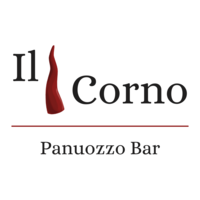Frances Clemente, CEO and founder of Il Corno

Frances (Fanny) is the CEO and founder of Il Corno, a Neapolitan food and beverage company in Covered Market, Oxford. Fanny has completed her PhD in Italian Studies at the University of Oxford, and she continues to conduct research and teach while running the family business.
I’m Neapolitan-British, with my mother being British and my father Neapolitan. I just completed my PhD in Italian culture and literature, and I'm currently teaching at the university. I have a strong desire and aptitude to share what I like with people. While studying for a doctorate, I realized that while writing for scientific journals is amazing, I’m only sharing my culture with few people in the academic circle. How could I share it with more people? The easiest and most direct way of sharing it is, well, through one’s mouth.
I’ve always wanted to do something entrepreneurial. I have a memory that connects to my entrepreneurial aspiration. When I was eight or nine years old, a friend of mine and I played together by pretending that we had a restaurant — we had school that day, but we made excuses not to go! We organized dishes and served food to our imaginary customers. That memory has gotten stuck inside of my head for a long time, and now it’s all coming back.
To bring this to a wider market, I had to learn entrepreneurial words and language. I thought, “You know what, I'm strong. I have a lot of energy. If I'm not going to do this now, I'm never going to do it.” This was during the pandemic, which gave me a lot of time to think about the project. Naples as a city and as a culture is booming now. We have tourists everywhere, including a lot of VIPs. Up until a couple of years ago, they all wanted to visit Florence and Rome, now everyone wants to go to Naples. Why? Because it’s exuberant, unexpected, chaotic, spontaneous, seducing, and… with mouthwatering food. So, I realized, I needed to get on this boat, I needed to make the most of this positive trend. I immediately registered the trademark, Il Corno (the name being directly inspired by Neapolitan culture), in April 2020, both in the UK and all over Europe. And I threw myself into this entrepreneurial adventure to bring some Neapolitan culture to Oxford.

Looking for something personal, not just a dictionary definition.
I would say it’s enthusiasm and willingness to be open. It’s also strength and courage. I’d say to be an entrepreneur, you need to be brave.
Entrepreneurship is much more practical, whereas the challenges I face in academia are mostly intellectual. As an academic, I am usually the sole responsible person for my research, whereas in business, the results depend on so many different factors, and you can't control them all. My business has many different layers, including stocks, suppliers, the council, brand, marketing, social media, and staff. Becoming an entrepreneur is to realize that I am not in control of everything, and I cannot be in control of everything. All I can do is try my best to realize this and work around this.
I was sure the Neapolitan brand concept was going to be a winner because I saw successful cases, or a general trend as I mentioned earlier, in so many different fields, from cinema to food. Not only in Naples but, more broadly, in Italy, I saw that the food & beverages industry was growing stronger than ever. See EATALY’s case, for instance, or, an even more appropriate example, All’Antico Vinaio, a Florentine sandwich shop that has passed from being a little store in Florence to an international food & beverages brand. It’s a family business and the son of the founders, with no entrepreneurial upbringing, turned it into a world-famous enterprise. Their stores are everywhere now, including in New York and Los Angeles.
This project has a strong cultural origin. At first, it was going to be a wine bar, but we shifted to the panuozzo concept because we saw that this kind of dish was still not popular in the British market. Panuozzo is like a panini sandwich made of pizza dough, and it's baked in the oven twice. It’s filled with delicious Neapolitan food, with 50 shades of mozzarella, meat, and vegan options, and a kind of vegetable that we only have in Naples, i.e., the friarielli. Our brand name and logo design are inspired by the corno or cornicello — it looks like a red pepper but it’s not! It’s a symbol of Neapolitan culture and folklore, linked to Greek and Roman mythology symbolizing fertility, abundance, and good fortune. That’s where our brand tagline comes from: “Where good food meets good luck.” Talking of food, people immediately think of pizza when they hear about Italian and, more specifically, Neapolitan food culture, but there’s so much more to our culture. I’m trying to expand the Neapolitan popular cuisine in the UK beyond pizza. That is my mission.
Also, my family has a connection to Oxford. My parents got married in Oxford and they just got into retirement. It felt like destiny in a way. I asked if they wanted to start a new adventure and brought them back here. My father is an engineer and architect with expertise in Italian design. My mother is a scholar of British tourism in Naples. This all made sense as a family business. Family business makes it easier to make decisions — I don’t have to set up 50 video calls to decide which kind of cheese we’d bring to our customers! We looked for a place in the Covered Market, and I thought, this is the place. It is located at the heart of Oxford, and this is where we bring the heart of Naples.
Time management, communication skills, and passion. First, you need to manage time. Since starting my business, my typical day operates like 48 hours a day instead of 24 hours. It feels as though I have 150 tasks but have 50 of them left at 11 at night. I have a clean-as-you-go policy, meaning that I do things as I go and don’t procrastinate on tasks. Multitasking is essential. This is very different from my PhD life, where I had 3 tasks to complete by the end of the day, and that was it. It’s non-stop tasks now.
Second, you have to communicate clearly. Especially for young women, situations can be tough at times, because older people, especially men, might display a patronising and superior attitude towards you. So, you’d have to demonstrate strong leadership to show you know what you’re doing. At the same time, you want to show the soft aspect of yourself to create strong bonds in the workplace, because at the end of the day, the business will be successful only if you develop trust. You want to be both a strong and, quite simply, a nice person.
Third, you need the passion that fuels you. Passion is what wakes you up in the morning and reminds you, “This is my mission.” I typically wake up at 6:30 am but I can assure you that you won’t be waking up that early without a passion!
This is a family business, so 50% of it was funded by myself and the other 50% came from my parents. I've put aside my money for this my entire life. Ever since I was a little girl, I saved money I received, for example, from my grandmother at my birthday party. I saved money while teaching at the university and almost didn’t spend money on anything.
Just do it! That's the slogan of Nike, one of the most successful businesses in the world. Go on, do it. It’s important to have passion in what you do because passion is what wakes you up every day and makes you keep moving forward. I started running my business while I was doing my PhD. Things can get crazy, and you might think, there's no way I'm going to do it. But I did it! Also, do not procrastinate; otherwise, you won't do it. Don't be afraid of doing something and thinking, “Maybe I don't have the skills.” I self-taught myself at first. Once you get started, talk to people, and the right people will help you.



